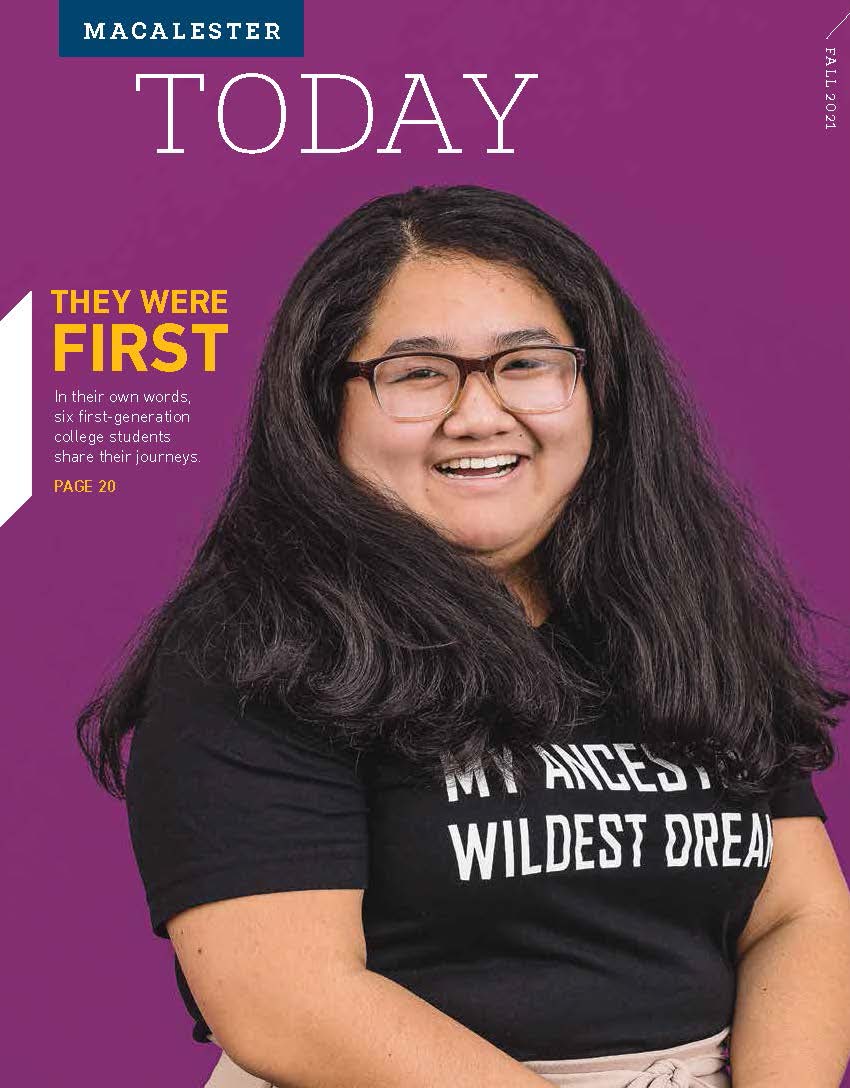
By Daniel P. Smith / Photo by Marc Oliver Le Blanc
They met during their opening weeks at Macalester in 1997—two South American students ushered across St. Paul in a Mac van to get their Minnesota ID cards.
During their junior year, they became roommates: two studious, goal-oriented souls intent on keeping a tidy residence in Kirk Hall.
They went their separate ways after graduation in 2001. José M. Mejía Oneto earned a PhD in organic chemistry from Emory University, then a medical degree from the University of Minnesota. He then became an orthopaedic surgery resident at the University of California–Davis. Sebastian Sanchez de Lozada joined a Twin Cities hedge fund before returning to his native Bolivia. He later came back to the U.S. to earn a master’s degree in international economics and finance at Brandeis University and ascended the corporate finance ladder at a Washington, D.C.-based mining company.
In 2015, the two reconnected in Washington, D.C., where Mejía Oneto told his former roommate about a promising biotech innovation he was developing to improve the way drugs travel in the body, and his plans to bring the tech to the masses. Two years later, Mejía Oneto officially recruited the business-savvy Sanchez de Lozada to join him.
Now, the two Macalester alumni are leading Shasqi, an ambitious startup that aims to improve the effectiveness of cancer therapies while minimizing their negative side effects.
Reuniting for a mission
When Mejía Oneto, a biology and chemistry major from Peru, left Mac, he dreamed of becoming a scientist making positive contributions to the world. While training as an orthopaedic surgeon, he noted that many drugs scattered across the body, not exclusively to the affected areas, such as a tumor. This frequently caused collateral damage, and Mejía Oneto wondered if there could be a mechanism to escort more of a drug to its intended location.
“Shouldn’t it be possible to tell the medication where to go, and to get more of the drug to the area where it was needed?” Mejía Oneto says.
That inquiry led Mejía Oneto to the emerging field of click chemistry. In his research at UC–Davis, Mejía Oneto developed a way to modify compounds so they would attract one another like magnets within the body. His innovation enabled more medication to reach the desired area while limiting a drug’s dispersion elsewhere in the body. “If you enhance the amount of the drug at the needed location in the body, then you can enhance efficacy and mitigate side effects,” he says.
So, Mejía Oneto left UC–Davis and began his quest to create a sustainable biotech business that would have a tangible impact on lives. He held encouraging early research, including animal testing data, and had landed a spot in the prestigious Silicon Valley-based Y Combinator accelerator program responsible for launching the likes of Reddit and Airbnb. But he still needed help steering his newly formed company. Enter Sanchez de Lozada, who in 2017 moved from Washington, D.C., to San Francisco to join Mejía Oneto in building Shasqi.
“José trusted me to make sure the non-scientific aspects of the business, like HR and finance, were running smoothly,” Sanchez de Lozada says.
When Sanchez de Lozada joined Shasqi, the entire company consisted of four people. Raising $18 million in funding, the Shasqi team has since expanded to an industrious, though still intentionally lean, group of 12.
Attacking “the impossible”
In 2018, Shasqi—a name drawn from the Inca Empire’s runners who transported goods and messages—made the strategic decision to focus exclusively on oncology.
Though chemotherapy drugs have proven effective in killing cancer cells, they can also damage other parts of the body, resulting in detrimental side effects. Such effects, like the destruction of immune cells, infection, and vomiting, can reduce patients’ quality of life to the extent that some cease treatment. Mejía Oneto believed that if Shasqi’s technology could funnel more chemo medication directly to a tumor site, it could improve treatment effectiveness as well as quality of life.
A clinical trial in the U.S. is testing the safety and efficacy of Shasqi’s proprietary Click Activated Protodrugs Against Cancer (CAPAC™) platform in up to 40 patients. By the close of 2021, Shasqi should complete the study’s dose escalation phase that aims to establish the maximum tolerated dose, before proceeding into Phase 1’s dose expansion phase with more patients.
It’s a daring effort that Mejía Oneto, Sanchez de Lozada, and their team have grounded in rigorous science, resourceful business strategies, and relentless energy.
The hope—and plan—is to continue along in the rigorous clinical testing process proving the technology, expand it, and improve patients’ lives. “We had people tell us it’s impossible, that it was not going to work, but we’ve built our company on the belief to let science and nature speak for what is possible,” Mejía Oneto says.
Both Mejía Oneto and Sanchez de Lozada say Shasqi’s enterprising ethos is rooted in their shared experience at Macalester, where the two international students discovered an inspiring world of possibilities and gratitude for the opportunities they encountered.
“I think we both realize the incredible privilege we had to get a Macalester education,” Sanchez de Lozada says. “That pushes us every day.”
Adds Mejía Oneto: “Like Sebastian, I know how fortunate I was to have the transformative experience to attend Mac. So, whatever we have, we’re going to contribute to improving the lives of others.”
Daniel P. Smith is a Chicago-based freelance writer.
November 16 2021
Back to top





